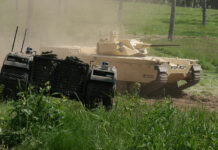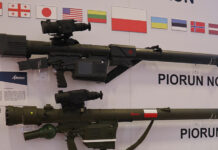 Defense Update is proud to add WBR’s Defence Geospatial Intelligence (DGI) 2011 to the list of defense professional events sponsored by us. DGI 2011 is Europe’s largest and most international annual gathering dedicated to the high-level discussion of the importance and the major challenges of the use of geospatial intelligence in both defence and national security operations.
Defense Update is proud to add WBR’s Defence Geospatial Intelligence (DGI) 2011 to the list of defense professional events sponsored by us. DGI 2011 is Europe’s largest and most international annual gathering dedicated to the high-level discussion of the importance and the major challenges of the use of geospatial intelligence in both defence and national security operations.
DGI brings together 700 heads of Geospatial Intelligence, Remote Sensing, GIS Mapping, Satellite Imagery and Analysis within the Military, Governmental and National Security sectors. It attracts professionals who are responsible for using, and integrating, geo based capabilities in their operations and organisations. DGI provides a unique forum for defense intelligence to discuss and debate the development of geospatial intelligence capabilities across the globe in defence and security sectors. Over 45 ministries of defence and governments are sending their senior officers and executives to join this geospatial intelligence community event. Among the attending delegations are members of the Ministries of Defense of the UK, Australian, French, Norwegian, Finland, Canada, NATO C3 Agency, EU Forces, AGCHO Afghanistan, UNOSAT, BGIO Germany, US Army, Department of Defense and Coast Guard, Italian Defence General Staff, and Israel’s Intelligence Service and others.
Addressing the use of geospatial information in scenarios such as international conflicts, defence intelligence operations, C4ISR, humanitarian disasters, crime, national security, border control, arms treaty monitoring and global climate change; a fundamental objective of DGI is to help organisations understand how to build the necessary infrastructure and architecture to take advantage of geospatial intelligence (GEOINT) capabilities.
Geospatial imaging services are used for a wide range of applications, beyond pure intelligence operations. The European Union (EU) is currently acting as the driving force for the so called “comprehensive approach”. The Global Monitoring of Environment & Security worth €1.6 billion is designed to integrate defence, civilian, national security and anti-terrorist GIS intelligence capabilities. This will achieve better results for all parties involved, and most importantly will keep the costs in tight control. It is especially relevant to the GIS intelligence community, as every European government is cutting costs, tightening budgets and reduces spend. Therefore, shrinking defense expenditure and the growing need for geospatial intelligence are expected to be the major themes at the upcoming 2011 event.
The changing role of geospatial capabilities in intelligence collection, analysis and decision-making, will be addressed by Royal Air Force Air Marshal Sir Stuart William Peach, Chief of Joint Operations at the UK Ministry of Defence. Air Marshal Peach is responsible for the planning and execution of UK-led joint, combined and multi-national operations. Prior to that, he was the Director General Intelligence Collection in the Defence Intelligence Staff. In this role Air Marshal Peach was responsible for the organisation of what makes up the largest sub-element of Defence Intelligence. He was in charge of the collection of Signals, Geo-spatial, Imagery and Measurement and Signature Intelligence.












